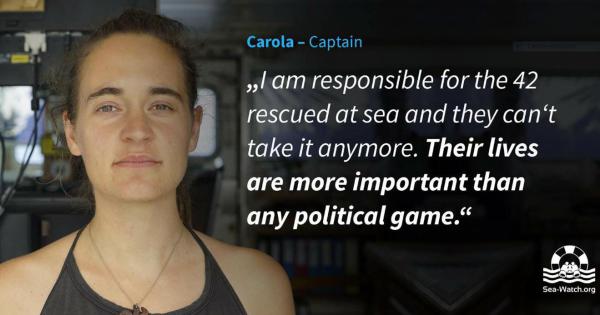Gianfranco Ferraro (EN_02.07.19)
I must confess two feelings about what happened in Lampedusa, just some days ago. On the one hand, clearly, a deep rejection of the insults and injuries I heard expressed towards Captain Carola Rackete. Something like a feeling of shame, for those injuries have been pronounced in my mother tongue. On the other hand, a little shame also for not have been there, for not have done yet what she did: to save some lives. Despite this, I have to confess I am not surprised. The decline of Italy can no longer be measured by the decline of its GDP, by the escape and massive emigration of a big number of its (high or extremely high qualified) sons and daughters, over the last two decades, by the complete lack of a serious political agenda for the future, and so on. The decline of Italy must be assessed as a sort of anthropological decline: a decline of the same virtues – sometimes mystified – that were represented by the formula “italiani brava gente” (Italian people, good people). It was of course a mystification, if we take into account this country’s responsability for the creation of fascism in XXth century or its colonialism. Despite this being true, something was justified in that expression: no one, until just some years ago, would have had the courage to publicly express those injuries. No one would have hesitated to say that the one who saves lives is on the right side of history.
The docks of Lampedusa, a small island some miles away from the great island at the centre of the Mediterranean See, Sicily, much more known for its mafia than for the extraordinary treasure of its culture and of the brave people who found their death fighting against mafia, as Giovanni Falcone and Paolo Borsellino, are a demonstration of this, unfortunately: a decline that is, at the same time, a great danger.
A danger for Europe and for all people escaping from war, from thirst and hunger, in order to give a little hope to themselves and their sons. On the docks of Lampedusa we can see an irreducible opposition: on one side, the great heritage of a civilization settled on the Roman and humanistic rights’ principles, on the ancient Greek principle of hospitality, and on the Christian, evangelical principle of charity (the most important one, as Paul said). On the other side, those grunts, sometimes literally unintelligible: something like a bar-bar language, as the ancient Greek people called those languages that were incomprehensible for them. A language that represents well the rotten heart of this country, and the rotten heart of European Union: its (un)politics concerning its citizens (the case of Greece is emblematic) and its borders are at the origins of this disaster.
The docks of Lampedusa, the end of Italy as a safe harbour of civilization, show very clearly the bankruptcy of the European project after World War II. We should be aware that another opportunity will probably be impossible. All that is happening in Germany, in France, in Greece, in Spain, in Hungary, in Poland, in UK, is concentrated there, on the docks of Lampedusa: it is time to defend the European civilization – really settled in the Greek-Roman, the evangelical, and the Enlightenment’s roots – against the new barbaroi, locking our harbours to the good European people of the future. This must be our struggle, the struggle of all people taking care of Europe and of its future.

